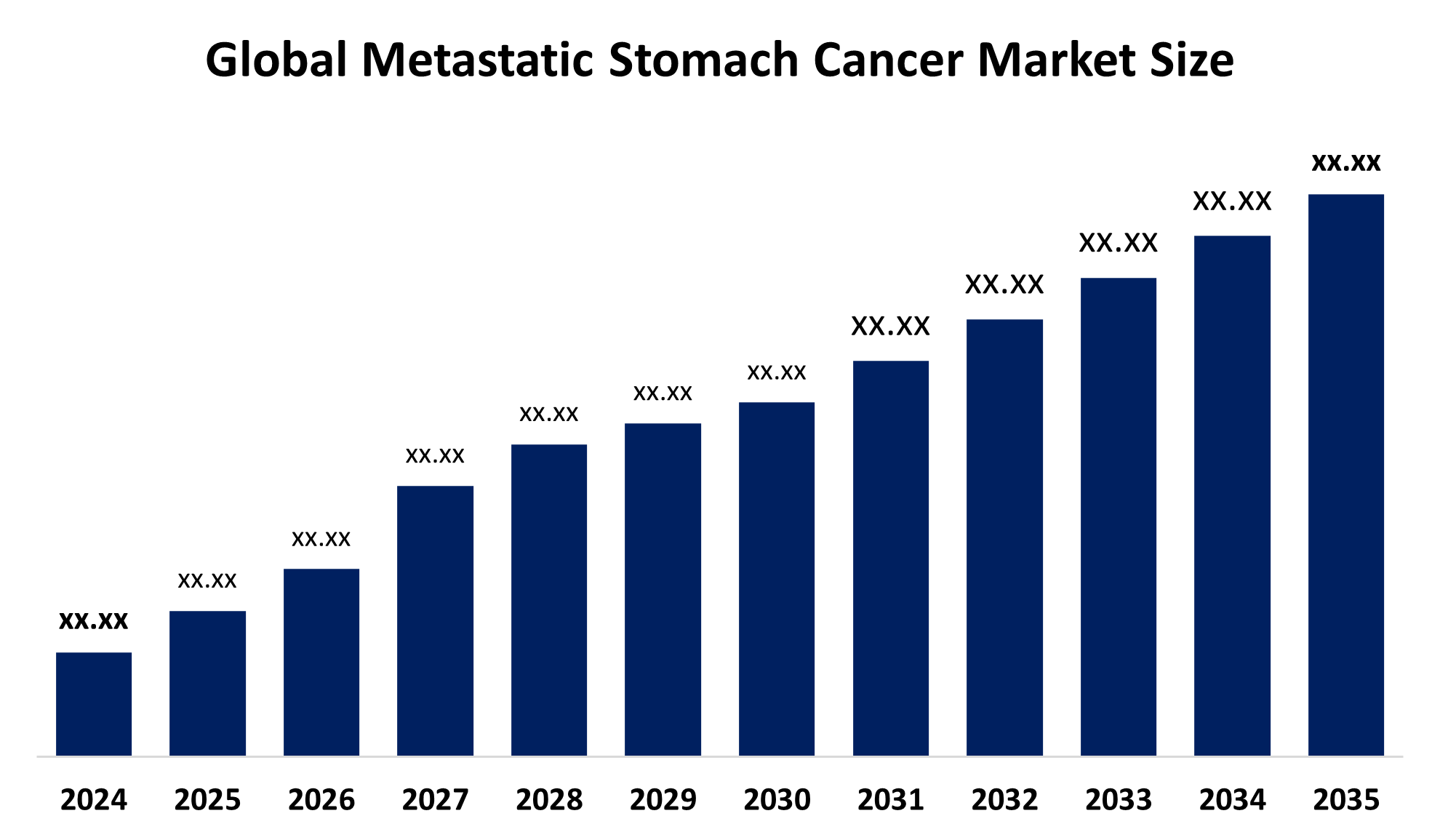Global Metastatic Stomach Cancer Market Size, Share, and COVID-19 Impact Analysis, By Treatment Type (Chemotherapy, Targeted Therapy, Immunotherapy, Radiation Therapy, and Surgical Interventions), By Distribution Channel (Hospital Pharmacies, Retail & Specialty Pharmacies, and Online Pharmacies), and By Region (North America, Europe, Asia-Pacific, Latin America, Middle East, and Africa), Analysis and Forecast 2025 - 2035.
Industry: HealthcareGlobal Metastatic Stomach Cancer Market Insights Forecasts To 2035
- The Global Metastatic Stomach Cancer Market Size is Expected to hold a significant share by 2035, at a CAGR of 7.2%
- Asia Pacific is Expected To Grow the fastest during the forecast period.

Get more details on this report -
The Global metastatic Stomach Cancer Market Size is Expected to hold a significant share by 2035, at a CAGR of 7.2% during the Forecast Period 2025-2035. The market for metastatic stomach cancer provides opportunities in the areas of immunotherapy, biomarker discovery, personalized medicine, targeted medicines, and growing investment in oncology research, all of which spur innovation and better patient outcomes in the international healthcare industry.
Market Overview
The global healthcare and pharmaceutical business segment devoted to the diagnosis, treatment, management, and research of stomach cancer that has spread to other parts of the body is known as the metastatic stomach cancer market. The products and services offered in this industry are diverse and include immunotherapies, targeted treatments, chemotherapy, diagnostic tools, and supportive care solutions. Clinical studies, medication development pipelines, regulatory clearances, and business plans used by biotechnology and pharmaceutical firms are also included.
Improvements in medical technology, higher R&D expenditures, and an increasing need for tailored and focused treatments are driving the market for treating metastatic stomach cancer. Increased incidence rates, growing awareness, improvements in medical technology, and the need for more individualized and efficient treatment alternatives are the main factors propelling the metastatic stomach cancer market.
Report Coverage
This research report categorizes the metastatic stomach cancer market based on various segments and regions, forecasts revenue growth, and analyzes trends in each submarket. The report analyses the key growth drivers, opportunities, and challenges influencing the metastatic stomach cancer market. Recent market developments and competitive strategies such as expansion, type launch, development, partnership, merger, and acquisition, have been included to draw the competitive landscape in the market. The report strategically identifies and profiles the key market players and analyses their core competencies in each sub-segment of the metastatic stomach cancer market.
Global Metastatic Stomach Cancer Market Report Coverage
| Report Coverage | Details |
|---|---|
| Base Year: | 2024 |
| Market Size in 2024: | xx.xx |
| Forecast Period: | 2025-2035 |
| Forecast Period CAGR 2025-2035 : | 7.2% |
| 2035 Value Projection: | xx.xx |
| Historical Data for: | 2020-2023 |
| No. of Pages: | 240 |
| Tables, Charts & Figures: | 110 |
| Segments covered: | By Treatment Type, By Distribution Channel, By Regional Analysis |
| Companies covered:: | Pfizer Inc., Amgen Inc., Sanofi S.A., Novartis AG, Merck & Co., Inc., AstraZeneca plc, Eli Lilly and Company, F. Hoffmann-La Roche Ltd, Taiho Pharmaceutical Co., Ltd., Bristol Myers Squibb Company, Others, |
| Pitfalls & Challenges: | COVID-19 Empact,Challenges, Future, Growth, & Analysis |
Get more details on this report -
Driving Factors
The rising incidence of stomach cancer worldwide, especially in aging populations, is one of the main factors driving the metastatic stomach cancer market. The ability to identify metastatic phases has improved due to advancements in diagnostic tools and early detection techniques, enabling prompt and focused therapies. Increased healthcare spending, infrastructural development, especially in emerging nations, and growing knowledge of cancer care all contribute to the market's growth. Strong clinical trial and medication development investments by biotechnology and pharmaceutical companies, as well as advantageous regulatory frameworks and accelerated approval processes, are driving the metastatic stomach cancer market.
Restraining Factors
The market for metastatic stomach cancer is restricted by factors such as the high expense of therapy, the difficulty of obtaining cutting-edge therapies in low-income areas, the unfavorable side effects of current treatments, and the difficulty of conducting clinical trials.
Market Segmentation
The metastatic stomach cancer market share is classified into treatment type and distribution channel.
- The chemotherapy segment dominated the market in 2024 and is projected to grow at a substantial CAGR during the forecast period.
Based on the treatment type, the metastatic stomach cancer market is divided into chemotherapy, targeted therapy, immunotherapy, radiation therapy, and surgical interventions. Among these, the chemotherapy segment dominated the market in 2024 and is projected to grow at a substantial CAGR during the forecast period. Chemotherapy's continued clinical and commercial importance is supported by the fact that it is still a key component of the management of advanced gastric cancer, especially in areas with little access to cutting-edge treatment choices.
- The hospital pharmacies segment accounted for the largest share in 2024 and is anticipated to grow at a significant CAGR during the forecast period.
Based on the distribution channel, the metastatic stomach cancer market is divided into hospital pharmacies, retail & specialty pharmacies, and online pharmacies. Among these, the hospital pharmacies segment accounted for the largest share in 2024 and is anticipated to grow at a significant CAGR during the forecast period. The primary need for the hospital pharmacy is the specialized nature of cancer treatments like immunotherapy, targeted therapy, and chemotherapy, which call for constant patient monitoring, strict storage conditions, and expert administration all of which hospital pharmacies.
Regional Segment Analysis of the Metastatic Stomach Cancer Market
- North America (U.S., Canada, Mexico)
- Europe (Germany, France, U.K., Italy, Spain, Rest of Europe)
- Asia-Pacific (China, Japan, India, Rest of APAC)
- South America (Brazil and the Rest of South America)
- The Middle East and Africa (UAE, South Africa, Rest of MEA)
North America is anticipated to hold the largest share of the metastatic stomach cancer market over the predicted timeframe.

Get more details on this report -
North America is anticipated to hold the largest share of the metastatic stomach cancer market over the predicted timeframe. High healthcare spending, a well-established healthcare infrastructure, and a significant emphasis on research and development are all characteristics of the North American region. Increased knowledge, better access to diagnostic and treatment services, and a high incidence of stomach cancer cases all contribute to the market's expansion. Furthermore, North America's dominant position in the worldwide market is largely due to the existence of top pharmaceutical and biotechnology businesses that are actively involved in clinical trials and innovation.
Asia Pacific is expected to grow at a rapid CAGR in the metastatic stomach cancer market during the forecast period. The increased prevalence of stomach cancer, growing healthcare knowledge, and better access to medical services in emerging nations are the main causes of the Asia Pacific region. Furthermore, the market is developing more quickly due to supportive government initiatives, increased investment in oncology research, and expanding healthcare infrastructure. The need for cutting-edge cancer treatments, such as immunotherapies and targeted medicines, is rising in nations like China, Japan, South Korea, and India.
Competitive Analysis:
The report offers the appropriate analysis of the key organizations/companies involved within the metastatic stomach cancer market, along with a comparative evaluation primarily based on their type of offering, business overviews, geographic presence, enterprise strategies, segment market share, and SWOT analysis. The report also provides an elaborative analysis focusing on the current news and developments of the companies, which includes type development, innovations, joint ventures, partnerships, mergers & acquisitions, strategic alliances, and others. This allows for the evaluation of the overall competition within the market.
List of Key Companies
- Pfizer Inc.
- Amgen Inc.
- Sanofi S.A.
- Novartis AG
- Merck & Co., Inc.
- AstraZeneca plc
- Eli Lilly and Company
- F. Hoffmann-La Roche Ltd
- Taiho Pharmaceutical Co., Ltd.
- Bristol-Myers Squibb Company
- Others
Key Target Audience
- Market Players
- Investors
- End-users
- Government Authorities
- Consulting And Research Firm
- Venture capitalists
- Value-Added Resellers (VARs)
Recent Development
- In October 2024, Astellas Pharma Inc. announced FDA approval of VYLOY™ for first-line treatment of adults with locally advanced unresectable or metastatic HER2-negative gastric or GEJ adenocarcinoma expressing CLDN17.2. VYLOY is the first and only CLDN17.2-targeted therapy approved in the U.S., marking a significant advancement in gastric cancer treatment.
- In May 2024, Merck announced that the Phase 3 KEYNOTE-811 trial of KEYTRUDA® combined with trastuzumab and chemotherapy achieved its dual primary endpoint of overall survival in first-line treatment of HER2-positive locally advanced unresectable or metastatic gastric and gastroesophageal junction adenocarcinoma, marking a significant milestone in cancer therapy.
Market Segment
This study forecasts revenue at global, regional, and country levels from 2020 to 2035. Spherical Insights has segmented the metastatic stomach cancer market based on the below-mentioned segments:
Global Metastatic Stomach Cancer Market, By Treatment Type
- Chemotherapy
- Targeted Therapy
- Immunotherapy
- Radiation Therapy
- Surgical Interventions
Global Metastatic Stomach Cancer Market, By Distribution Channel
- Hospital Pharmacies
- Retail & Specialty Pharmacies
- Online Pharmacies
Global Metastatic Stomach Cancer Market, By Regional Analysis
- North America
- US
- Canada
- Mexico
- Europe
- Germany
- UK
- France
- Italy
- Spain
- Russia
- Rest of Europe
- Asia Pacific
- China
- Japan
- India
- South Korea
- Australia
- Rest of Asia Pacific
- South America
- Brazil
- Argentina
- Rest of South America
- Middle East & Africa
- UAE
- Saudi Arabia
- Qatar
- South Africa
- Rest of the Middle East & Africa
Frequently Asked Questions (FAQ)
-
1. What is the CAGR of the metastatic stomach cancer market over the forecast period?The global metastatic stomach cancer market is projected to expand at a CAGR of 7.2% during the forecast period.
-
2. What is the market size of the metastatic stomach cancer market?The global metastatic stomach cancer market size is expected to hold a significant share by 2035, at a CAGR of 7.2% during the forecast period 2025-2035.
-
3. Which region holds the largest share of the metastatic stomach cancer market?North America is anticipated to hold the largest share of the metastatic stomach cancer market over the predicted timeframe.
-
4. Who are the top 10 companies operating in the Global metastatic stomach cancer market?Key players include Pfizer Inc., Amgen Inc., Sanofi S.A., Novartis AG, Merck & Co., Inc., AstraZeneca plc, Eli Lilly and Company, F. Hoffmann-La Roche Ltd, Taiho Pharmaceutical Co., Ltd., Bristol-Myers Squibb Company, and Others.
-
5. What are the top investment opportunities in the global metastatic stomach cancer market?Top investment opportunities in the global metastatic stomach cancer market include targeted therapies, immunotherapy development, biomarker research, personalized medicine, advanced diagnostics, and strategic collaborations, driven by rising cancer prevalence and demand for innovative treatment options.
-
6. What challenges are limiting the adoption of metastatic stomach cancer market?Challenges limiting the adoption in the metastatic stomach cancer market include high treatment costs, limited access in low-income regions, adverse side effects, complex clinical trials, and regulatory hurdles affecting widespread therapy availability and acceptance.
Need help to buy this report?